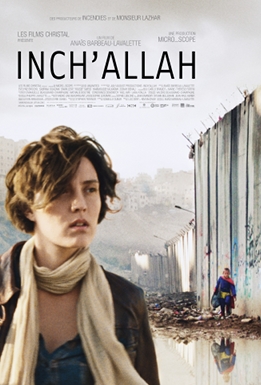I hope I don't see a movie more depressing than Inch'Allah this year. A movie that features a little boy being run over, a stillbirth, and several bombings, it's a movie fraught with death.
The devastatingly beautiful Evelyne Brochu plays Chloé, a Canadian obstetrician working in the West Bank but living in Jerusalem. As she gets to know her patient Rand (Sabrina Ouazani), she begins to understand just how tough life is in the occupied region.
And she doesn't take it well, often numbing herself with alcohol and meaningless sex. Of course this is part of Inch'Allah's paradoxical problem as a film: We need Chloé as a conduit to process the horrors we're seeing, but this is yet another movie by a Western filmmaker that forces real racial strife to be viewed through the prism of a privileged white person.
Even so, Inch'Allah is frequently harrowing and beautifully shot, the better to detail the daily misery of life in the area. This is a place where everyone is suspicious of each other, where bombings are par for the course. One scene in particular hit me like a punch in the gut: After a particularly powerful explosion, first responders begin stacking cell phones outside the rubble, as one after another begins to ring and vibrate, with the voices on the other end presumably calling to see if the loved one is unharmed.
Scenes like these punctuate lengthy, numbing shots of Chloé commuting to work, through the checkpoint, to work, back through the checkpoint, to her apartment, then to parties and back home, only to repeat the cycle the next day. It gets awfully repetitive, and cuts short time the film could have used to follow more interesting characters like Rand or Chloé's best friend Ava (Sivan Levy).
Inch'Allah provides an all too brief glimpse into the seemingly never-ending conflict between Israel and Palestine. The movie, in an effort not to appear one-sided, offers no clear answers for moving forward. It obviously didn't need to solve the problem, but it could have made an effort to make some kind of statement beyond, "This is bad."

